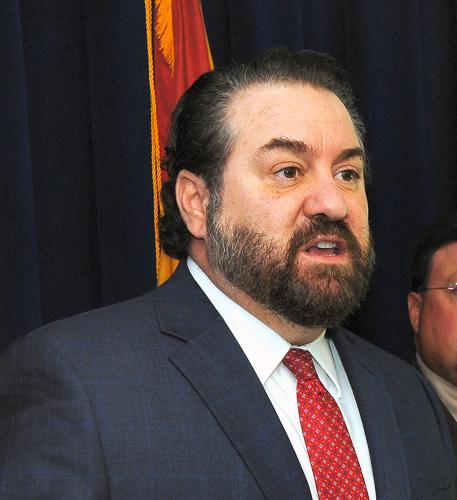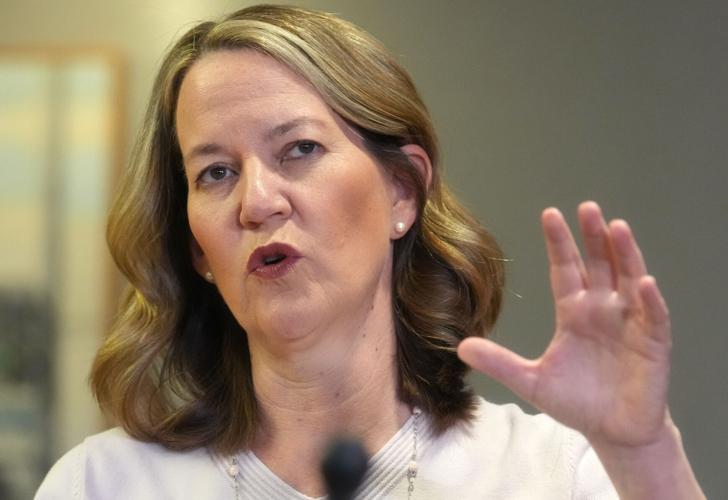The 2020 election was conducted fairly — and former Attorney General Mark Brnovich knew it despite publicly claiming there were “instances of fraud,” his successor reported Wednesday.
“The results of (the state’s) exhaustive and extensive investigation show what we have suspected for over two years: The 2020 election in Arizona was conducted fairly and accurately by election officials,’’ said Attorney General Kris Mayes.
But that information was wrongly withheld by Brnovich, she told Capitol Media Services.
In releasing documents prepared last year that Brnovich had kept secret, Mayes said this is about more than putting to bed unfounded allegations the 2020 election was rigged.
Had the reports been released last year, they could have made a difference in the “dark cloud’’ that was cast over the 2022 election, she said.
“The insane conspiracy theories perpetrated by high-profile election deniers could have and should have been stopped, especially as it relates to Maricopa County and its elections officials,’’ said Mayes, a Democrat who succeeded Republican Brnovich in January.
“Every American had a right to know that the 2020 election in Arizona, which, in part, decided the presidency, was conducted accurately and fairly,’’ Mayes said, adding:
“I think the people of Arizona had a right before the 2022 election, and Maricopa County elections officials had a right to know that they were cleared of any wrongdoing. And that obviously didn’t happen.’’
Mayes, who edged out Republican Abe Hamadeh in the 2022 election for attorney general, also said there’s an important goal accomplished in finally making public all of the information that Brnovich had in his hands last year.
“It’s time for us to move forward and it’s time for our state and our country to heal,’’ she said. “And I’m hoping that this information will help in that regard.’’
Mayes said she could not say whether Brnovich, who was running last year for U.S. Senate, purposely withheld the information.
Brnovich: ‘We did our due diligence’
Brnovich, in a statement to Capitol Media Services, did not respond to the question of why he had not released the reports before he left office at the end of 2022.
But he defended conducting the inquiry, even if it did not result in verifying the claims by some of widespread fraud in the 2020 race.
“While subjected to severe criticism from all sides of the political spectrum during the course of our investigations, we did our due diligence to run all complaints to ground,’’ he said. “Where we were able to debunk rumors and conspiracies, we did so.’’
Brnovich said his report did identify changes the Legislature and county officials should address “to ensure confidence in future elections.’’ Those included instituting new procedures to verify the people using mail-in ballots are who they say are; requiring the state auditor general to review future elections; and spelling out in law the procedures for transporting ballots from drop boxes.
The documents released by Mayes on Wednesday are at odds with some of the claims made by Brnovich in an “interim report’’ in April 2022, as he was in the running for the Republican nomination for U.S. Senate, that investigators had “uncovered instances of election fraud by individuals who have been or will be prosecuted for various election crimes.’’
He also claimed at the time that Maricopa County was using artificial intelligence to verify signatures on early ballots, a claim county officials disputed. And Brnovich, in his report to then-Senate President Karen Fann, reported “there are problematic systemwide issues that related to early ballot handling and verification.”
Withheld key information
But the documents Mayes released showed that even as he released that interim report in April 2022, Brnovich had reason to believe there was little basis for many of his statements. A month before, his own staffers made notes to Brnovich’s top aide, Joe Kanefield, on what was then a draft.
For example, staffers said their investigators concluded the Maricopa County Recorder’s Office followed its policies and procedures as they related to signature verification.
“We did not uncover any criminality of fraud having been committed in this area during the 2020 general election,’’ the staff notes say.
None of that was made public in Brnovich’s April interim report.
Brnovich also claimed in that April report that procedures used in the county could result in election officials approving ballots that should not be otherwise approved without further investigation.
But the staffers said investigators learned that the Recorder’s Office had provided training by a handwriting expert to signature verifiers, used a multi-step process to review questionable signatures, and had hired additional staff due to the sheer volume of ballots to be processed.
This, too, was not in Brnovich’s interim report.
Also missing from what was released in April were other staff notes disagreeing with Brnovich’s report.
In addition, Mayes said, a September memo from the attorney general’s Special Investigations Section was withheld from the public.
It said agents and support staff had spent more than 10,000 hours investigating and reviewing alleged instances of illegal voting submitted by various private parties. Those parties included Cyber Ninjas, the private firm without any election auditing experience hired by Fann, and True the Vote, a group at the forefront of denying the results of the 2020 election.
“In each instance and in each matter, the aforementioned parties did not provide any evidence to support their allegations,’’ the September memo stated. “The information that was provided was speculated in many instances and when investigated by our agents and support staff, was found to be inaccurate.’’
Elected officials tightlipped in probe
Moreover, the investigators said elected officials had made public statements asserting that voting fraud had occurred and that fraud was a factor in the outcome of the 2020 election.
Yet when questioned by investigators under circumstances where they could be prosecuted for making false reports to law enforcement agencies, “the elected officials did not repeat or make such assertions.’’
They included then-Rep. Mark Finchem, R-Oro Valley, who had publicly stated he had a source reporting that more than 30,000 fraudulent or fictitious votes were registered in Pima County during the 2020 general election. Investigators then requested to speak with him.
“During that meeting, Mr. Finchem did not repeat those allegations, specifically stating he did not have any evidence of fraud and he did not wish to take up our time,’’ the investigators reported.
What he did provide were four ballots he said were evidence of a flawed process for mailing and counting ballots.
The investigators, however, said they found the ballots had been mailed to prior residents of the address on file, the residents had moved, the ballots could not be forwarded, and they were unopened and not counted.
They also said a claim by Sen. Sonny Borrelli, R-Lake Havasu City, that someone who had voted was deceased also proved false. “The actual voter in this state was alive and had lawfully voted,’’ the report said.
And they said Sen. Wendy Rogers, R-Flagstaff, who had alleged widespread fraud in the 2020 election, “refused to meet with us, saying she was waiting to see the ‘perp walk’ of those who committed fraud during the election.’’
Other allegations that investigators said were unfounded in the report not released until Wednesday included:
That subjects dropped off large numbers of ballots at local post offices;
That paper ballots were filled out by machines;
That tabulators connected to the internet, allowing votes to be switched;
That election officials deleted information and overwrote hard drives containing voter information.
That satellites “under the control of the Italian military changed the votes recorded in tabulators in favor of Joe Biden.’’
Brnovich changed tune
Brnovich had come under fire in 2022, as he was running for Senate, from some members of his own Republican Party for not accepting their arguments that the 2020 election has been fraudulently conducted and that Donald Trump actually won the popular vote in Arizona.
In fact, Brnovich was one of the first elected GOP officials in Arizona to declare after the 2020 vote that Democrat Joe Biden apparently had won the race. And Brnovich, right after the election, rejected as baseless claims of election fraud by Democrats, pointing out that, aside from Trump and U.S. Sen. Martha McSally, who lost her race, Republicans fared well in down-ballot races.
He also pointed out that Democratic Maricopa County Recorder Adrian Fontes, whose office jointly oversaw the vote counting in the state’s most populous county, was going down to defeat.
“If indeed there was some great conspiracy, it apparently didn’t work, since the county election official who’s a Democrat lost and other Republicans won,’’ Brnovich said then.
But in early 2022, as he was campaigning, Brnovich found himself being blasted by other Republicans also seeking the nomination for U.S. Senate. And Trump released a statement saying “people want to know whether or not Attorney General Brnovich is doing the right thing, or is it just politics as usual.’’
Clint Hickman, who chairs the Maricopa County Board of Supervisors, issued a statement Wednesday saying he was “absolutely disgusted’’ by revelations that Brnovich “failed to do his job as a public servant’’ and concealed reports that showed the election was conducted fairly, lawfully and accurately.
He blasted Brnovich for “”never correcting the record and blatantly not sharing the team’s final report with the public.”
“This was a gross misuse of his elected office and an appalling waste of taxpayer dollars, as well as a waste of time and effort of professional investigators,’’ Hickman said.
Get your morning recap of today's local news and read the full stories here: tucne.ws/morning







